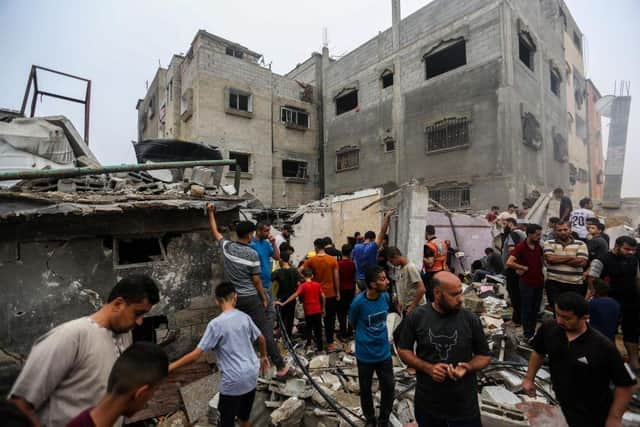Israel Hamas war: Warning over breakdown of ‘civil order’ in Gaza as thousands break into aid warehouses to take basic survival items
There are signs that civil order is “starting to break down” in Gaza, a United Nations agency has warned, as thousands of desperate citizens broke into aid warehouses to access basic survival items.
Meanwhile, an aid agency has warned scarcity of water is becoming life-threatening in Gaza. ActionAid warned the situation was “catastrophic”, with many people becoming ill from dehydration and others forced to drink dirty or salty water.
Advertisement
Hide AdAdvertisement
Hide AdThe United Nations Relief and Works Agency for Palestine Refugees in the Near East (UNRWA) said people had stormed warehouses and distribution centres in the middle and southern areas of the Gaza Strip, taking wheat flour and other basic survival items such as hygiene supplies.


Distribution of aid had been hampered on Saturday by an internet and phone blackout in Gaza amid continued heavy bombing by Israel.
“This is a worrying sign that civil order is starting to break down after three weeks of war and a tight siege on Gaza,” said Thomas White, director of UNRWA affairs in the Gaza Strip. He said one of the warehouses, in Deir al-Balah, is where UNRWA stores supplies from the humanitarian convoys are coming from Egypt.
Mr White added: “People are scared, frustrated and desperate. Tensions and fear are made worse by the cuts in the phones and internet communication lines. They feel that they are on their own, cut off from their families inside Gaza and the rest of the world.”
Massive displacement of people from the north of the Gaza Strip southward has placed enormous pressure on those communities, adding further burden on crumbling public services. Some families have hosted up to 50 relatives taking shelter in one household.
The internet and communications blackout on Saturday also left people with relatives in Gaza unable to find out if they were still alive – while those in need were unable to contact the emergency services.
Mr White said: “Supplies on the market are running out, while the humanitarian aid coming into the Gaza Strip on trucks from Egypt is insufficient. The needs of the communities are immense, if only for basic survival, while the aid we receive is meagre and inconsistent.”
Just over 80 trucks of aid have crossed into Gaza in one week. There was no convoy due to the blackout in communications on Saturday. UNRWA – the main actor for the reception and storage of aid in the Gaza Strip – was not able to communicate with the different parties to coordinate the passage of the convoy.
Advertisement
Hide AdAdvertisement
Hide AdMr White said: “The current system of convoys is geared to fail. Very few trucks, slow processes, strict inspections, supplies that do not match the requirements of UNRWA and the other aid organizations, and mostly the ongoing ban on fuel, are all a recipe for a failed system. We call for a regular and steady flow line of humanitarian supplies into the Gaza Strip to respond to the needs especially as tensions and frustrations grow.”
A senior spokesperson for the World Food Programme said the raids on aid distribution centres in Gaza on Saturday were "expected" because of the "difficult conditions facing people".
Abeer Etefa said: "The bottom line is that people are desperate, they are hungry."
Riham Jafari, co-ordinator of advocacy and communication for ActionAid Palestine, said the amount of water being brought into Gaza was a “drop in the ocean” compared with the desperate level of need. She said their charity partners in the region were themselves unable to access basic water supplies.
“They are telling us that the situation is catastrophic, scarcity of water is becoming live threatening, people are dehydrated and becoming sick,” she said. “Many can’t access clean water for drinking and resort to drinking salty or unclean water.
“Access to safe water and basic sanitation is a legal entitlement. All essential aid, including water, food, medicine and fuel, must be allowed into Gaza immediately and in sufficient quantity before people start to die from dehydration or disease. For as long as it continues, the deprivation of goods and services essential for life potentially constitutes collective punishment of the people of Gaza; this would be a serious violation of international humanitarian law.”
The charity said in addition to there being no drinking water, citizens are unable to wash themselves, their clothes or flush toilets, and warned the risk of deadly waterborne and other infectious diseases spreading was growing.
One ActionAid staff member in Gaza said: “Sadly, nowhere is safe in the Gaza strip, with no access to water or electricity. As a woman, I’m suffering. I don’t have access to the basic necessities of life.
Advertisement
Hide AdAdvertisement
Hide Ad"There is no water. I suffered during my period. There was no water available for me to get clean from my period blood. I couldn’t provide sanitary pads for my own needs throughout my period.”
Internet services and connections were restored in Gaza on Sunday and it is hoped convoys and distribution of assistance can begin again this morning.
On Sunday, Prime Minister Rishi Sunak and French president Emmanuel Macron spoke about the expansion of Israel’s military operation in Gaza.
A Downing Street spokeswoman said: “The leaders stressed the importance of getting urgent humanitarian support into Gaza. They agreed to work together on efforts both to get crucial food, fuel, water and medicine to those who need it, and to get foreign nationals out.
“They expressed their shared concern at the risk of escalation in the wider region, in particular in the West Bank. The Prime Minister and President Macron updated on the conversations they have had with leaders in the region to stress the importance of working to ensure regional stability."
Comments
Want to join the conversation? Please or to comment on this article.
